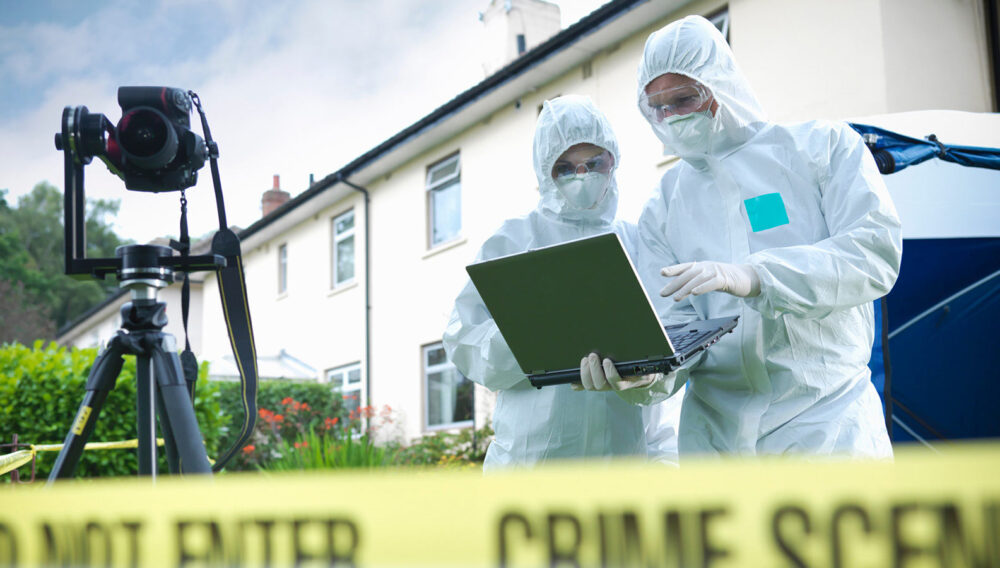Career Spotlight: Forensics Specialist

Are you interested in joining the criminal justice field but not sure law enforcement is for you? Learn about a career as a forensic specialist to see whether it’s a good fit for you.
What Is a Forensics Specialist?
A forensic specialist works at crime scenes and specializes in collecting and analyzing forensic evidence. Depending on the job, some forensic specialists spend their days at crime scenes with an investigative team, while others spend their days in the lab researching and analyzing evidence. Most end up specializing in a specific area of forensic science throughout their career (i.e., forensic psychology, forensic toxicology, forensic odontology, forensic DNA analysis, etc.).
Forensics Specialist Job Duties and Responsibilities
While the job duties vary based on what area you specialize in and where you work, most forensic specialists focus on:
Identifying and Collecting Evidence
Forensic specialists work with law enforcement at crime scenes to collect evidence. They take direction from detectives on scene, and their extensive training allows them to identify relevant evidence. In addition, they are experts in removing evidence from a scene without damaging it.
Documenting and Preserving Evidence
Record keeping is key to any criminal investigation. Accurate documentation of evidence must be kept throughout the process so the evidence can be used later in court. After a forensic specialist collects evidence, they make detailed notes, including evidence’s appearance and location at the scene. Some specialists may also take photographs and create drawings of the evidence to keep on file.
In addition, forensic specialists are responsible for preserving the evidence. They place evidence in sealable packaging, and documentation shows a record of everyone who handles it after it was collected and bagged. This documentation is extremely important to ensure the integrity of the evidence so that it can be used in court.
Testing Evidence
Other responsibilities include analyzing the evidence. In some cases, a different forensic specialist may analyze evidence, or the specialist who collected the evidence may also analyze it. This is done in a crime lab, where specialists analyze fingerprints, examine weapons and bullets, and test samples of bodily fluids. They focus on every detail from the crime scene, leaving no stone unturned.
Reporting Findings
Forensic specialists summarize their findings in a written report so other law enforcement officials can review the conclusions. Detectives use these reports in investigations and prosecutors use them as evidence in a trial. In addition to providing a written report, there are some instances where forensic specialists need to testify in court and explain their findings to a jury.
Qualities of a Forensic Specialist
Forensic specialists must be a strong:
- Problem-solvers: Forensic specialists must use scientific tests and methods to analyze crime scene evidence. Many forensic specialists work alongside police, detectives, and other law enforcement officials to help solve crimes.
- Critical thinkers: Forensic specialists use their best judgment when working to solve crimes and must be able to think outside the box and scientifically to match physical evidence to suspects.
- Communicators: Many forensic specialists report their findings to leadership and will need to testify in court for some cases. It is important to be able to explain findings in a way that the public can understand.
- Researchers: A forensic specialist needs a strong understanding of statistics and sciences to analyze evidence.
In addition to these skills, forensic specialists must be detail-oriented. Details are the most important thing to keep in mind when analyzing crime scenes.
Education Requirements for Forensic Specialists
To be successful, forensic specialists need at least a bachelor’s degree in criminal justice. In addition to a degree, it is also important to have some professional experience working in a laboratory. The bachelor’s degree in criminal justice from Excelsior University is perfect for those who are also looking to work in a lab during their studies. The degree is completely online, providing flexibility for students keep their jobs throughout the entire program.
Forensic Specialists Salary
According to Zippia, forensic specialists earn a salary of $47,690 a year on average. To earn a leadership position as a forensic specialist, a master’s degree in criminal justice combined with work experience is also important. The job outlook for forensic specialists is expected to grow 14 percent by 2028.



